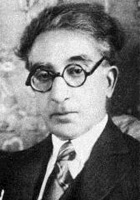King Claudius Poem by Constantine P. Cavafy
King Claudius
My mind now moves to distant places.
I'm walking the streets of Elsinore,
through its squares, and I recall
the very sad story-
that unfortunate king
killed by his nephew
because of some fanciful suspicions.
In all the homes of the poor
he was mourned secretly
(they were afraid of Fortinbras).
A quiet, gentle man,
a man who loved peace
(his country had suffered much
from the wars of his predecessor),
he behaved graciously toward everyone,
humble and great alike.
Never high-handed, he always sought advice
in the kingdom's affairs
from serious, experienced people.
Just why his nephew killed him
was never actually explained.
The prince suspected him of murder,
and the basis of his suspicion was this:
walking one night along an ancient battlement
he thought he saw a ghost
and he had a conversation with this ghost;
what he supposedly heard from the ghost
were certain accusations against the king.
It must have been a fit of fancy,
an optical illusion
(the prince was nervous in the extreme;
while he was studying at Wittenberg,
many of his fellow students thought him a maniac).
A few days later he went
to his mother's room to discuss
certain family affairs. And suddenly,
while he was talking, he lost his self-control,
started shouting, screaming
that the ghost was there in front of him.
But his mother saw nothing at all.
And that same day, for no apparent reason,
he killed an old gentleman of the court.
Since the prince was due to sail for England
in a day or two,
the king hustled him off post-haste
in order to save him.
But the people were so outraged
by the monstrous murder
that rebels rose up
and tried to storm the palace gates,
led by the dead man's son,
the noble lord Laertes
(a brave young man, also ambitious;
in the confusion, some of his friends called out:
'Long live King Laertes!').
Later, once the kingdom had calmed down
and the king was lying in his grave-
he was killed by his nephew, the prince,
who never went to England
but escaped from the ship on his way there-
a certain Horatio came forward
and tried to exonerate the prince
by telling some stories of his own.
He said that the voyage to England
had been a secret plot, and orders
had been given to kill the prince there
(but this was never clearly ascertained).
He also spoke of poisoned wine-
wine poisoned by the king.
It's true that Laertes spoke of this too.
But couldn't he have been lying?
Couldn't he have been mistaken?
And when did he say all this?
While dying of his wounds, his mind reeling,
his talk seemingly delirious.
As for the poisoned weapons,
it was shown later that the poisoning
hadn't been done by the king at all:
Laertes himself had done it.
But Horatio, whenever pressed,
would produce even the ghost as a witness:
the ghost said this and that,
the ghost did this and that!
Because of all this, though letting Horatio talk,
most people in their hearts
pitied the poor king,
who, with all these ghosts and fairy tales,
was unjustly killed and disposed of.
Yet Fortinbras, who profited
by winning the throne so easily,
gave full attention and weight
to every word Horatio said.
This poem has not been translated into any other language yet.
I would like to translate this poem